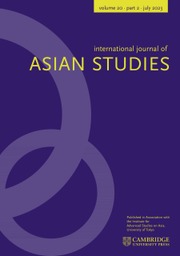No CrossRef data available.
Article contents
RURALISM IN CHINA: REINTERPRETATION OF POST-COLLECTIVE DEVELOPMENT
Published online by Cambridge University Press: 30 June 2005
Abstract
This paper reinterprets the societal nature of Chinese rural development by introducing the concept of ruralism. By ruralism, extending Edward Said's epistemology, I denote all those social, cultural, political, and economic ideas and actions about rural peoples and places that have been devised and implemented by urban-based elite groups to justify urban-centered programs of economic and social transformation and necessitate self-negating changes (and non-changes) in rural people's everyday life. Ruralism has much more to do with the interests of urban economic, political, and social groups than with the realities of rural people's life. However, it exerts a formidable self-fulfilling power by inducing and coercing rural people to comply with the specific ways of thinking, acting, and relating described or, more precisely, prescribed therein. Ironically, communist China, which had been built through an agrarian social revolution, presents a particularly pertinent case of ruralist (under)development. The suppression of nonagricultural activities and geographic mobility, the compulsory concentration in grain production, and the forced social, political, and economic autarky (or self-reliance in euphemism) all presupposed a stagnant, introverted, and austere mode of existence on the part of Chinese peasants. Therefore, many of the particular characteristics of peasant life in the collective era were ruralist inventions and reinventions which Chinese peasants were neither accustomed to nor pleased with. In many respects, post-Mao rural reform has been a process of undoing – and thereby unlearning – the ruralist policies and practices of the collective era. Such undoing, more unexpectedly than expectedly, came to release the enormous developmental potential of autonomous peasant families in agricultural, industrial, and tertiary economic activities. But the undoing of ruralism is in no sense complete, and even new elements of ruralism have been added during the reform process.
- Type
- INDEPENDENT PAPERS
- Information
- Copyright
- © Cambridge University Press 2005




